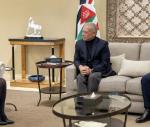You are here
Building stability in chaos: Jordan between Gaza and the new world dis-order
Apr 15,2025 - Last updated at Apr 15,2025
As the world braces for yet another shift in its geopolitical and economic foundations, Jordan finds itself, once again, at the intersection of crisis and opportunity. The Kingdom’s enduring role as a voice of moderation and stability is being tested on multiple fronts: from the escalating war in Gaza and mounting pressure on the West Bank, to the unraveling of global economic cooperation as the US–China trade conflict deepens.
In this turbulent moment, His Majesty King Abdullah stands as a symbol of principled leadership. His steadfast rejection of the forced displacement of Palestinians from Gaza is not merely a humanitarian stance, it is a strategic assertion of Jordan’s national interest and a reaffirmation of its historical role as a custodian of regional stability. His recent meeting with US President Donald Trump exemplified this delicate balancing act: upholding core values while maintaining open, pragmatic dialogue with key global actors.
But this leadership, however essential, must be matched by a strong internal front, a unified, informed national consensus that resists misinformation, political polarization, and external attempts to fragment Jordanian resolve.
While the headlines are dominated by the violence in Gaza, a quieter but equally consequential battle is unfolding on the global economic stage. The trade war between the United States and China, recently reignited with reciprocal tariff hikes, some reaching as high as 125 per cent, is not merely about market access or trade deficits. It is a strategic confrontation involving technology, supply chains and political influence.
Increasingly, these economic weapons are being aimed not at industries, but at political constituencies. China, for example, has halted imports of key American agricultural products from Republican-dominated states like Iowa and Nebraska, echoing the EU’s earlier targeting products from these “red-states”. The goal is clear: to exert political pressure through economic pain.
Markets are responding with volatility: gold is surging, the dollar is fluctuating, and investors are retreating to safe havens. For developing economies like Jordan, the consequences are significant, tighter access to capital, costlier debt servicing, and shrinking aid support. Coupled with regional instability and a sluggish global recovery, the danger of a prolonged economic slowdown is real.
Yet Jordan’s story is not one of vulnerability. It is a story of remarkable resilience and adaptability. Over the past 100 years, through world wars, regional conflicts, refugee crises, financial collapses, and even a global pandemic, the Hashemite Kingdom has not only survived but carved out a distinct and respected role on the international stage.
This legacy of stability must now be leveraged into strategic repositioning. Jordan can, and should, aspire to become a regional hub for logistics, innovation and green transition, especially as global supply chains fragment and new economic centers emerge.
Investment in higher education, renewable energy, digital infrastructure, and industrial transformation will not only fortify Jordan’s economy but elevate its relevance as a bridge between East and West, both geopolitically and economically.
In this moment of flux, the country must act decisively, diversifying its economic partnerships, reinforcing its production base, and protecting its social fabric. But above all, it must foster a cohesive and confident national narrative, one that draws strength from its past and dares to imagine a more sovereign and dynamic future.
Because the real choice facing Jordan is not whether it can withstand the storm, it has done so for a century. The real challenge is whether it can turn this storm into momentum, to lead, to innovate, and to emerge not just unscathed, but stronger.
Wissam Rabadi is a former minister of Planning and International Cooperation. [email protected]













Add new comment